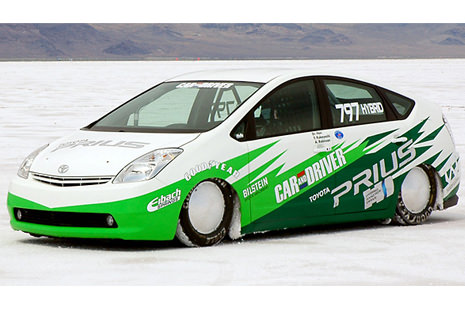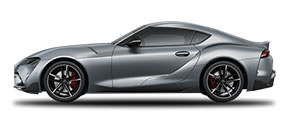
Many people think of the Prius as a quiet, fuel-friendly, family & youth – oriented vehicle. However, the Prius has made quite an impact even in hybrid racing – which represents a new type of racing. Racing not only proves how sophisticated hybrid technology is, but it also represents the fast lane towards developing ever-better hybrid technology.
The first-generation Prius was released in 1997, utilizing the first Toyota Hybrid System (THS) to offer dramatic improvements in fuel efficiency.
In 2003, Toyota released the next big evolution to the hybrid system with the THS II, equipped in the second-generation Prius. Its notable to mention that even this early in the vehicle’s development Toyota had been planning a high performance Prius for hybrid racing.This led to the development of the Landspeed Prius, which set a record speed for hybrids at the Bonneville National Speed Week with an impressive 210.5 Kmph speed.
In 2007, Toyota entered into the Tokachi 24-hour race using a Toyota Supra with a specialized hybrid racing system and achieved a splendid overall victory!
After this achievement, Toyota engineers set their eyes on an ambitious new target: winning the 24 Hours of Le Mans. Tucked away behind closed doors, they worked feverishly to develop a brand new, dedicated hybrid race-car that would eventually be known as the TS030. The TS030 and its successor were about to change the course of modern-day motorsports forever.
Toyota entered the Le Mans race in 2012 with the TS030 Hybrid equipped with the new THS-R (Toyota Hybrid System-Racing). In the qualifying stage, the TS030 achieved an impressive speed of 335.2 kmph, the fastest speed of any competitor.
But that was only the beginning.
In 2014, Toyota debutedthe all-new TS040 Hybrid race-car, and at that time, it was considered a rank outsider. The vehicle delivered around 1000 horsepower and could attain a top speed of 340 kmph on the straightaway. The TS040 went on to help Toyota Racing win the 2014 drivers’ and manufacturers’ titles to mark a successful conclusion to the FIA WEC season. The win was a clear demonstration of the capabilities of a hybrid race-car and its high performance prowess in a challenging racing environment. It also endorsed Toyota’s global leadership and progress in developing advanced hybrid technology.
A hybrid system generates electricity to recharge the batteries during deceleration by converting kinetic energy into electrical energy for storage. Racing cars have to brake violently and repeatedly throughout the race, so a lot of effort must be spent ensuring that a large amount of energy can be generated over a short time. When this technology is fed back into production cars, it allows for the development of extremely efficient hybrid cars that can regenerate electricity at any speed range.
Toyota’s philosophy of utilizing motorsports as a tool to make ever-better road cars has been embraced by the WEC programme, with hybrid technology transfer from the race track benefiting road car development since the beginning of the project in 2012.
A powerful hybrid system from Toyota is thus quietly changing the face of modern motorsports and perceptions about the capabilities of hybrid racing cars. Racing not only brings out the best in our engineers, but also spurs technological innovation. The next-generation Prius is a result of these dedicated efforts.








































